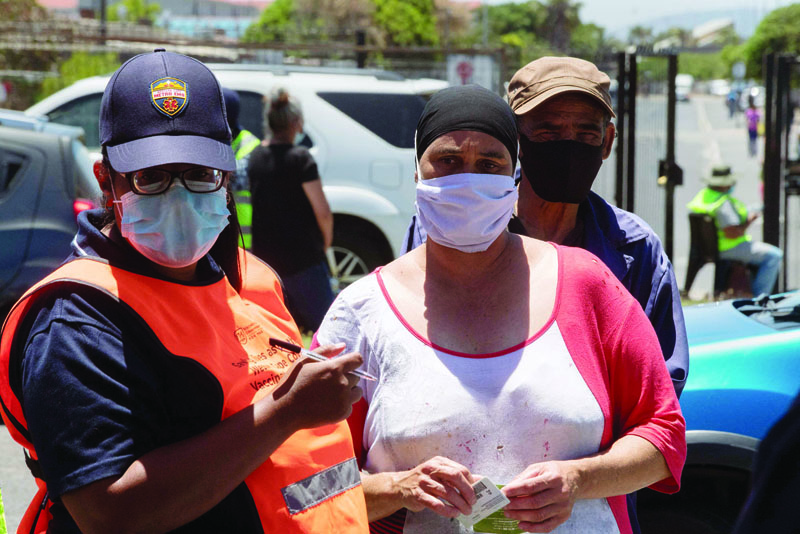 CAPE TOWN: A member of the Western Cape Metro EMS(Emergency Medical Services) helps people register from an ambulance which has been converted to facilitate vaccinations at a COVID 19 vaccination event in Manenberg, which is part of the Vaxi-Taxi mobile vaccination drive, yesterday. - AFP
CAPE TOWN: A member of the Western Cape Metro EMS(Emergency Medical Services) helps people register from an ambulance which has been converted to facilitate vaccinations at a COVID 19 vaccination event in Manenberg, which is part of the Vaxi-Taxi mobile vaccination drive, yesterday. - AFPGENEVA Switzerland: Countries considering introducing vaccine mandates in the fight against COVID-19 must ensure they respect human rights, the UN rights chief said yesterday, stressing that forced vaccination was never acceptable. Speaking to a Human Rights Council seminar via video message, Michelle Bachelet warned there were significant rights considerations that needed to be taken into account before making vaccination compulsory.
Any "vaccine mandates must comply with the principles of legality, necessity, proportionality and non-discrimination", she said, according to a transcript. "In no circumstances should people be forcibly administered a vaccine." The UN High Commissioner for Human Rights said the aims sought by countries mulling mandates to protect lives as Europe and other regions battle fierce surges in the pandemic, were "of course of the highest order of legitimacy and importance".
But she insisted that "vaccine mandates should be employed only when necessary for achieving compelling public health ends". "And they should only be considered when less intrusive measures such as mask-wearing and social distancing have demonstrably failed to meet such health needs." She also emphasised that for any mandate to be acceptable, countries needed to ensure that vaccines are truly available and affordable.
"Unless all people have genuine, practical access to vaccines, vaccine requirements will not be consistent with fundamental human rights principles of equality and non-discrimination," she said. Bachelet also highlighted that "the actual vaccines employed must also be sufficiently safe and effective to achieve (the) public health aims." Any mandatory vaccination regime also must be flexible enough to allow for "appropriate exceptions, such as where a vaccination is medically contra-indicated for an individual."
Bachelet said it could be appropriate to restrict some rights and liberties, including conditioning access to schools, hospitals or other public spaces on vaccination. But forced injections was never acceptable, she said, "even if a person's refusal to comply with a mandatory vaccination policy may entail other legal consequences, including, for example, appropriate fines". "Where penalties are imposed, they should be proportionate and subject to review by judicial authorities," she said.
There needed to be "appropriate procedural safeguards, including the right to seek a justified exemption and the right to appeal any form of penalty before a fair and independent authority," she insisted. Looking forward, the UN rights chief said any vaccine mandates introduced "should be subject to frequent official review to ensure they remain necessary, proportionate and non-discriminatory."
Meanwhile, HIV infection rates in Africa have decreased markedly, but the continent is still behind set targets, with efforts slowed by the COVID-19 pandemic, the World Health Organization said Tuesday. "Africa has made significant progress against HIV over the past decade, reducing new infections by 43 percent and nearly halving AIDS-related deaths," the WHO Africa office said in a statement. But it warned that Africa was not likely to meet a target to end AIDS as a public health threat by the turn of the decade as COVID has undermined the fight in many countries.
"COVID-19 has made the fight against HIV all the more challenging, but one virus must not win out over another. We must tackle COVID-19 and HIV in parallel," WHO Africa chief Matshidiso Moeti said. COVID has also slowed HIV screening rates because of restrictions of movements. UNAIDS last week warned that HIV infection rates were not decreasing fast enough to reach the goal of eradicating AIDS by 2030. According to data released at the annual International Conference on AIDS and Sexually Transmitted Infections (ICASA) currently being held in South Africa's port city of Durban, only nine African countries are on track to meet the target in the next four years.
The countries are Botswana, Cape Verde, Kenya, Lesotho, Malawi, Nigeria, Rwanda, Uganda and Zimbabwe. "This scorecard is a wake-up call for African governments to stay focused on ending AIDS," Moeti said. South Africa, the country with the world's highest HIV prevalence at 20.4 percent, is hosting the week-long annual meeting bringing together scientists, politicians and activists. - AFP









